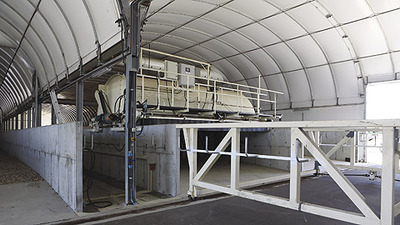Sowing the seeds for a clean energy future
Friday, 03 May, 2013
Richgro is an Australian-owned family business that has been helping people tend their gardens since 1916. The company’s soil conditioner, potting mix, fertiliser and other products are sold in hardware outlets such as Bunnings Warehouse, Home Timber & Hardware, Mitre10 and garden centres.
In mid-2009, Richgro drew up plans to install a major organic fertiliser plant on its site in Jandakot, Western Australia. This would enable the company to produce 18,000 tonnes of organic fertiliser each year - a product with strong sales potential.
“Over the last few years, we have seen a tremendous spike in the cost of imported fertiliser around the world,” said Richgro Managing Director Geoff Richards. “So Australia’s agriculture and horticulture sectors need to be using more local organic fertiliser. By producing good organic fertiliser, our company can tap into more markets and develop a solid base for future growth.”
However, the creation of this new plant would increase Richgro’s annual electricity bill to almost $500,000. To avoid this, the company sought a solution that would allow it to produce its own electricity.
Thanks to a nearly $1.1 million grant from the Australian Government’s Clean Technology Investment Program, Richgro is putting in place an electricity generation solution based around anaerobic digestion (AD). This is a process where organic materials, such as food waste, are decomposed naturally by bacteria to produce biogas, electricity and compost.
After researching the experience of similar companies overseas, Richgro decided to create an AD plant to help power its new organic fertiliser facility. The AD plant will be partly funded by the grant.
Once functional, Richgro’s AD plant will consume around 100 tonnes of liquid food waste a day and produce a gas stream that will be 60% methane and around 38% carbon dioxide. The methane will be used to drive the site’s generators - much like LPG in a car - and the carbon dioxide will be pumped into the company’s hothouses to help berries grow. The remaining gas will be used to prepare Richgro’s fertiliser products.

“We’ll use every little bit of food waste for something useful,” Richards said.
The AD plant will allow Richgro to generate enough electricity on-site to meet its total requirements. The company will reduce electricity consumption from external sources to almost zero and reduce carbon emissions by 100%.
Richgro anticipates the plant will be in operation from 1 July 2013, and it will only take three months until the company can completely rely on its own electricity production.
“As a company, we’re very keen on protecting the environment and encouraging sustainability,” Richards said. “Our site is on the Jandakot Groundwater Mound, which provides Perth’s urban drinking water supplies. So Richgro’s always worked to stringent environmental criteria.”
Through the initiatives funded by the grant, Richgro expects to:
- reduce carbon emissions by 100%,
- reduce electricity consumption by 100%, and
- save electricity costs of $500,000 per year.
A touch of sugar could help upcycle carbon dioxide into fuels
A new catalyst made from table sugar could have the power to upcycle carbon dioxide...
Heat recovery could save money and the environment
Up to 96% of the drive energy supplied to a compressor is available for reuse — this is...
Dirty dancing across a new energy landscape
The real-time balancing of electricity generation (supply) and demand is like a dynamic dance and...











